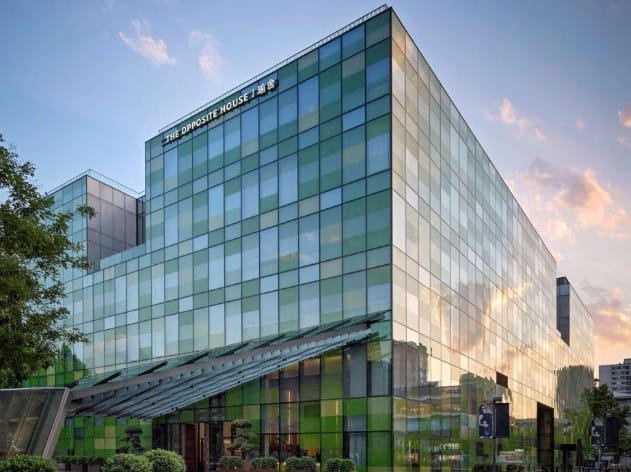
The Opposite House in Beijing was Swire’s first hotel
Nearly 16 years after opening Opposite House in Beijing as its first hotel project, Swire Properties plans to replace Opposite House in Beijing with an “innovative retail landmark”, as the Hong Kong-based developer continues to reap strong profits from its mainland China shopping centres.
Located in Swire’s Taikoo Li Sanlitun retail development in Beijing’s Chaoyang district, the 99-key hotel will cease operation on 30 June in preparation for its revamp, in what the HKEX-listed developer described as an “asset enhancement programme”.
“Since 2008, (Taikoo Li Sanlitun) has established itself as an iconic retail destination in the capital,” the Swire Properties spokesperson told Mingtiandi. “The latest plan represents Swire Properties’ long-term commitment to Sanlitun, with another major investment to enhance the retail infrastructure and experience at TLS. We expect the plan to support the development of the Sanlitun business circle and contribute to Beijing’s transformation into an international consumption hub.”
The transformation comes as Swire’s mainland retail business accounted for 34 percent of its gross rental income in 2023, the second largest contributor after its Hong Kong office segment, with the attributable valuation of its six mainland retail properties having increased 10 percent from the prior year to HK$56.7 billion ($7.3 billion) as of December.
Hotels as Loss Leaders
The Opposite House’s shuttering comes as Swire’s hotel segment posted an operating loss of HK$103 million in 2023 despite revenue having climbed 73 percent from the previous year to HK$979 million, accounting for 6.7 percent of the company’s total revenue during the period.

Swire Properties chairman Guy Bradley
“It has been a very difficult decision to close The Opposite House, which has played a significant role in establishing The House Collective as an internationally renowned brand, and we have been very proud of its many successes over the years,” the Swire spokesperson said, adding that Swire’s long-term strategy includes the continued expansion of its hotel business.
Swire’s hospitality portfolio includes owned and managed properties under its House Collective and EAST brands located in Hong Kong, mainland China and Miami, as well as equity stakes in other premium branded hotels in those markets. The builder’s managed hotel portfolio totaled 2,120 keys as of December, while non-managed hotels totaled 3,138 keys.
In addition to the Opposite House, Swire’s mainland hotel portfolio includes the wholly owned Temple House in Chengdu, a 97 percent stake in the Mandarin Oriental Guangzhou, and half stakes in EAST Beijing, the Middle House Shanghai, and the Sukhothai Shanghai.
The company is also set to manage a third party-owned hotel in Shenzhen under its House Collective brand when the property opens in 2025, while the company also plans a House hotel in its forthcoming Taikoo Li Xi’an project. Another property under Swire’s House brand is said to be on the way in Tokyo.
Swire said that The House Collective and EAST brands remain an “integral” part of its mixed-use developments, with the builder pointing to “good progress” in its asset-light third party management model.
Retail Recovery
The repositioning of Opposite House would add the hotel’s 169,463 square feet (15,744 square metres) of gross floor area to Taikoo Li Sanlitun’s existing 1.6 million square feet (150,767 square metres) of retail space, which currently ranks as Swire’s largest mainland retail development by gross floor area.
The three-block development, which was Swire’s first project completed in mainland China, recorded occupancy of 94 percent as of December and a 31 percent jump in retail sales last year. The project has over 200 shops, nearly 70 dining outlets and a cinema.
Retail stood out as Swire’s best-performing segment last year with gross rental income climbing 22 percent, after some malls in Hong Kong, mainland China and Miami achieved full occupancy and pre-pandemic sales levels. The company notched HK$7.1 billion of retail rental income across all markets in 2023, eclipsing office as its largest segment with a 49 percent share of total revenue.
In mainland China, total attributable gross rental income from Swire’s retail properties in Beijing, Shanghai, Guangzhou and Chengdu increased 20 percent year-on-year to HK$5.1 billion on the back of improving occupancy and a 46 percent surge in sales from the previous year.
Swire’s mainland retail portfolio totals 7.7 million square feet of gross floor area, with the developer having set a goal of doubling that by 2032 as part of a HK$100 billion investment plan for core markets announced in 2022, of which half has been earmarked for projects in the mainland.
Among those mainland developments are Taikoo Li retail-led projects in Xi’an and Sanya.
Leave a Reply